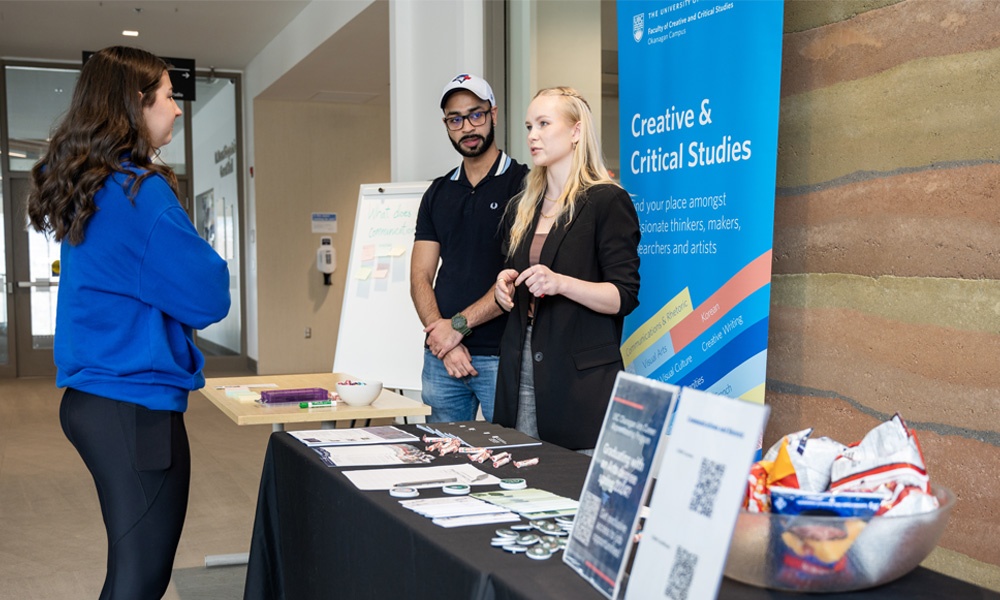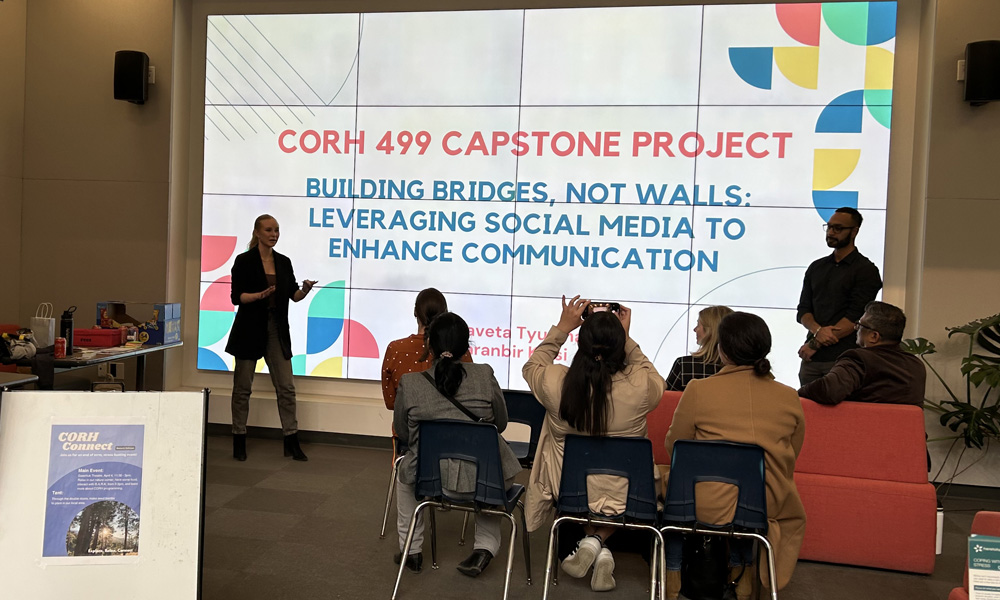Inquire
Anita Chaudhuri
Communications & Rhetoric Student Advisor
anita.chaudhuri@ubc.ca
Anita Chaudhuri
Communications & Rhetoric Student Advisor
anita.chaudhuri@ubc.ca

Degree
Bachelor
Length
4 years
Faculty/School
Faculty of Creative and Critical Studies
Courses in Communications and Rhetoric develop advanced level communication and research skills in specific disciplines: humanities, sciences, and social sciences. Students will gain interdisciplinary knowledge in a range of communication and rhetoric concepts, theories, and skills, to help them work efficiently in academic, professional, and diverse sociocultural contexts.
Communications and Rhetoric is distinct in addressing an identified need for a more diverse, inclusive and laddered approach to developing students’ skills in communication and rhetoric, including oral, written, performative, digital, and creative communications.
Rhetoric is embedded in every act of communication through the purpose and persuasive strategy that we weave into our verbal, non-verbal, and creative acts.
Communications and Rhetoric provides additional ways of knowing, learning, and producing collaborative research through different pathways of experiencing communication concepts through literary and cultural studies, the creative arts, world literature and languages, as well as management, the sciences and social sciences.
Undergraduate students can take classes in Communications & Rhetoric as electives, as a 30-credit minor or complete a 15-credit certificate in any degree at UBC Okanagan.
To receive a Communications & Rhetoric certificate, students must complete 15 credits through courses from four thematic interdisciplinary and relational clusters, and a final capstone project.
Courses offered in this area will prepare students for the vital role of written, oral and digital communications in the 21st century workplace. Students produce a variety of texts and creative artefacts in professional, intercultural and community settings to enhance career opportunities.
These are examples of courses you can enrol in during your studies. For a full list of courses you can take for the certificate or minor, visit the Academic Calendar.
By researching, analyzing and creating digital, textual, audio, and visual media, students will engage with contemporary communication theory and practice. Choose three (3) credits from the following courses:
CORH 216 Communication and Media
ANTH 252 Visual Anthropology and New Media
ARTH 323/CULT 320 Creative Activism: Art Media and Social Justice
ARTH 390 Indigenous Art and Visual Culture, and Culture
ARTH 411/DIHU 411 Digital Media for Interpretive Centres
ARTH 451 Politics of Exhibition and Representation
COSC 247 Networks and Social Media
COSC 341 Human Computer Interaction
CRWR 474 Writing with Media
CULT 315/ENGL 376 Television Studies
CULT 316/FILM 303/THTR 303 Narrative Film Production
CULT 317/FILM 371 Digital Documentary Production
CULT 325 Media and the Politics of Identity
ECON 310 Writing Economics for the Media
HES 433 Knowledge Translation in Health and Exercise Sciences
GWST 215 Gender and Popular Culture
MGMT 220 Introduction to Marketing
MGMT 440 Brands, Culture and Marketing
MGMT 441 Marketing Strategy
THTR 401 Live Art/New Media
VISA 268 Strategies in Digital Art: Visual Communication
VISA 269 Strategies in Digital Art: Virtual Worlds
Understandings of self and how the self impacts relationships with others are a foundation for effective personal and professional communication. Choose three (3) credits from the following courses:
CORH 321 Personal and Professional Identity and Interpersonal Communication
ANTH 230 Culture, Happiness, and Wellness
CULT 375/ENGL 342 Auto/Biography Survey
GWST 333 Perspectives on Gendered Bodies
THTR 201 Performer/Creator Resources
THTR 212 Creativity as Source and Resource
Interpersonal communication skills across a range of digital, written, and oral platforms can enhance students’ abilities to navigate professional, personal, and academic contexts. Choose three (3) credits from the following courses:
CORH 331 Social Writing: Studies in Multimodal Communication
ANTH 373 The Acquisition of Language and Cultural Practice
ANTH 377 Sociolinguistics
ANTH 474 Language Emergence: From Contact to Constructed Languages
CRWR 472 Editing and Publishing
CULT 230/ENGL 224 Foundations: Reading Across Borders
CULT 346/ENGL 384 Human Rights, Literature, and Culture
GWST 333 Perspectives on Gendered Bodies
HES 231 Exercise Counseling and Behavioural Modification
INDG 310 Indigenous Women’s Perspectives: Gender, Nation, State, Resistance
MGMT 230 Introduction to Organizational Behaviour
MGMT 410 Leadership in Complex Environments
MGMT 411 Human Resource Management
MGMT 412 Negotiations
PHIL 425 Philosophy of Language
SOCI 209 Foundations of Sociological Thought
THTR 201 Performer/Creator Resources
WRLD 382 Cross-Cultural Travel Narratives
Communication genres and styles are agreed upon within communities; this cluster offers students in-depth understanding of communications expectations, needs, and challenges within a range of communities. Choose three (3) credits from the following courses:
CORH 203 Communication in the Sciences
CORH 204 Communications in the Humanities
CORH 205 Communication in the Social Sciences
CORH 206 Communicating Indigeneity
ANTH 252 Visual Anthropology and New Media
ANTH 277 Anthropology of Reading and Writing
APSC 201 Technical Communication
ARTH 202 The Critical Viewer
CRWR 210 The Power of Story
CRWR 310 The Power of Metaphor
CRWR 472 Editing and Publishing
CRWR 473 Writing and Community Learning
CULT 360 Public Memory, Commemoration, and Identity
DIHU 220 Research with Media in the Humanities
ECON 310 Writing Economics for the Media
ECON 351 Women in the Economy
EESC 398 Technical Communications
ENGL 203 Topics in Composition
GEOG/ SUST 201 Introduction to Research in Sustainability and Geography
GWST 323 Feminist Epistemologies: Gender, Science, and Knowledge
HES 433 Knowledge Translation in Health and Exercise Sciences
HINT 408 Cultural Safety in Health: Indigenous Perspectives
INDG/ ENGL 202 Okanagan Syilx Literatures: Concepts and Frameworks
INDG 301 Examining an Indigenous Methodology: En’owkinwixw
INDG 310 Indigenous Women’s Perspectives: Gender, Nation, State, Resistance
MGMT 220 Introduction to Marketing
MGMT 230 Introduction to Organizational Behaviour
MGMT 240 Introduction to Management Communications
MGMT 410 Leadership in Complex Environments
MGMT 411 Human Resource Management
MGMT 414 Managing and Leading Non-Profit and Public Sector Organizations
PSYO 270 Introduction to Research Methods and Design
SOCI 209 Foundations of Sociological Thought
SOCI 320 Cultural Studies in Sociology
THTR 204/SUST 204 Creative Communication and Engagement
Communication skills are highly valued in most industries and identified as essential employment skills by the Government of Canada, as well as a core expectation from a university degree by the National Association of Colleges and Employers.
You could soon be studying at one of the world’s top universities. Be sure to review the content below to prepare for attending UBC Okanagan.
Students pursuing any undergraduate degree at UBC Okanagan can register to complete the CORH Certificate, and must have completed all the pre-requisites for the required courses. Students must register for the certificate, and are expected to contact an academic advisor before enrolling in the Certificate program to assess their eligibility and academic progression.
Already applied? Check your status or accept your offer.

Expand your horizons while studying abroad, conducting meaningful research, or working in the community with your UBC colleagues.
Learn more about Co-op, Go Global, Undergraduate Research Awards and other opportunities at Experiential Education.
Through the capstone project for the CORH minor and certificate, students complete a team or individually based project and students work with on and off-campus community partners to build communication skills applicable to diverse professions. Classes are workshop based, discussing principles of advanced communication, and students apply those principles to student projects. At the end of the semester, students present their projects in both academic and professional contexts.

A diverse natural region with sandy beaches, beautiful farms, vineyards, orchards and snow-capped mountains, the Okanagan is an inspirational landscape perfect for those seeking leisure or outdoor adventure.
UBC’s Okanagan campus borders the dynamic city of Kelowna, a hub of economic development with a population of more than 150,000 people— the fourth fastest-growing population in Canada.
Already applied? Check your status or accept your offer.